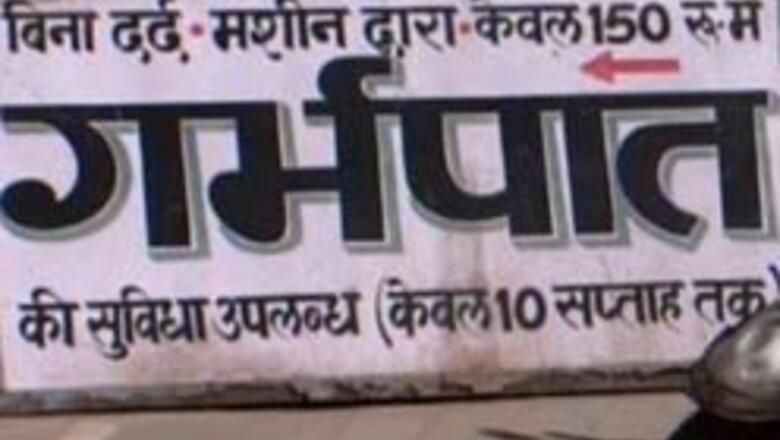
views
Niketa Mehta has been in the eye of the storm after she and her husband decided to abort their 25-week-old foetus that suffers from congenital heart disorder.
Niketa and her husband have initiated Mumbai's first legal challenge to the country's 37-year-old law, preventing abortion beyond 20 weeks unless the pregnancy constitutes a health risk for the mother. The couple’s plea to allow them to terminate the pregnancy has triggered a big debate in medical and legal circles.
Doctors say that abortion at this stage is not only illegal but also dangerous for the health of the mother.
The 1971 Medical Termination of Pregnancy Act does not allow an abortion beyond 20 weeks of pregnancy. Niketa, who is in her 25th week, has sought an amendment to the act.
The Act – formulated 37 years ago, when there were no techniques to tell whether the foetus would be normal – has become archaic. So many feel that there is enough reason for amendment.
This brings to the question that was asked in a special debate on CNN-IBN: Should the Mehtas be allowed to terminate the pregnancy?
Niketa Mehta took part in the debate along with a panel of experts including Founders of Uday Foundation for Congenital Defect Rahul and Tulika Verma, Director of Action for Autism Merry Barua and President of Indian Medical Association Dr Ajay Kumar.Love versus law
Why would parents be willing to terminate the baby despite the fact that medical technology is so advanced these days?
Kumar opened the debate by saying, “There is law of the land and that says upto 12 weeks there is one obstetrician that decides if the baby needs to be terminated. Upto 20 weeks, two obstetricians will decide. Now in this case it is a question of 25 weeks. So clearly the law does not allow termination at this stage.”
Speaking on behalf of her family, Niketa said that the child would suffer more by coming into this world. “We are sure, we need to take this step because the baby will suffer a lot after its birth. Me and my family’s sufferings are a different story, but we don’t want the baby to suffer.”
Is the apprehension that the society will not be sensitive enough to such a child forcing Niketa to take this decision?
“Nobody will come to see the day-to-day trauma of the baby and the mother. Even if the government will provide funds, it cannot help my child,” Niketa said.
PAGE_BREAK
In this case the mother thinks that by seeking the death of her unborn child she is actually releasing the child from suffering. Should one not allow the mother to do that?
Kumar reasoned that in this country euthanasia is not allowed. “By your own choice you cannot kill someone. Here the foetus is 100 per cent depended on the mother. And so the mother is creating a situation of euthanasia, which cannot be allowed. I would like to tell Mrs Mehta that you know your child has a heart problem and may need a pacemaker. But the rate at which medical science is advancing you never know when a solution to such a problem can be found.”
The Mehtas’ case is coming up in the Bombay High Court on Monday. With less than 24 hours left, does Niketa still feel that at the end of the day it is her personal call and not that of anyone else, irrespective of the fact that medical science is advanced or not advanced?
Niketa, who has factored in all these points which are being raised by the medical fraternity said, “I am not just fighting for myself here. There are many parents who have called me up to show their support. When the court makes the amendment, it will not just be for me but the society also.”
Meanwhile, Barua said, “This is a complicated situation and I do not know whether I have the expertise to comment on this specific case. What I would say is that it is difficult to bring up a child with any form of disability. With regard to such cases, what the country is then trying to say is that those with disability are in some way lesser than those who do not have a disability. If we start making exceptions then we could come to a situation in which parents would want to get rid of the child because it is not what they wanted. In India, female foeticide is a serious issue. These things have to be taken into consideration before we come to any conclusion.”
We should not be walking into circumstances where nothing less than a super-baby is accepted to one and all. Is it true that if this allowed, parents will not settle for anything less than a perfect baby?
“Yes, I agree with Mrs Barua,” Tulika said.
PAGE_BREAK
“You should not have the option of doing whatever you want to do with your foetus. If this situation of the baby having a heart problem had arisen after the baby was born then what would the mother have done? Why not give the baby a chance. Here doctors are also saying that the baby can be treated. I am speaking from experience. My child too had multiple problems but he is doing fine now,” she added.
However, Niketa said, “Besides the financial burden there are many other things that we have taken into consideration. The trauma of the baby needs to be considered. The baby will not be able to lead a normal life. No doctor has assured me yet that the baby will be normal.” Abortion laws
We are living in an age when parents wish to have a particular DNA for their child, then what is wrong with a couple who does not wish to have a child when they know that their child will not lead a perfect life.
“We are moving towards a world where anybody who is different is not wanted. As long as we live in a humane society we cannot move towards such kinds of eugenics. I am not being judgemental about this family. The young couple are themselves trying to come to terms with their decision. They are thinking the way society has taught them to think,” Barua said.
“I also want to touch on two more points. Like Tulika said what happens if one discovers after the child is born that he has some sort of a disability? Would you want to kill your child then? The other aspect is what the couple said, ‘what will happen to a child after we are no longer there?’ I understand but that does not mean that we do not have children with special needs. What we do need to do is set up a system that will take care of such people,” Barua added.
Considering this particular case, should the deadline of 20 weeks for abortion be changed by the government?
Kumar said, “This is not the forum to discuss why the limit is for 20 weeks. After the said time frame the foetus is grown up enough that even if a mother gives birth to the child then it will survive.”
In most cases when parents have to make a choice to abort or not a child, does the fact that which section of the society they come from factor in?
“India is too rich to let this child die without a fight,” Rahul Verma said.
“With due respect to this mother, I am ready to adopt this baby. This is not just a foetus, we are talking about a six-month-old baby here. We are talking about mercy killing. As far as monetary concerns are being raised, then pacemakers are the simplest of things to do in congenital heart disease cases. I have seen a case in which a baby had a partially formed heart and yet the baby survived,” an optimistic Verma added.
After having heard all these voices on show, Niketa ended the debate by concluding, “This is not an unwanted child. All I want to know is that is a healthy life possible for my child without a pacemaker.”Results of the poll: Should the Mehtas be allowed to terminate the pregnancy?
Yes – 65 per cent
No – 35 per cent



















Comments
0 comment